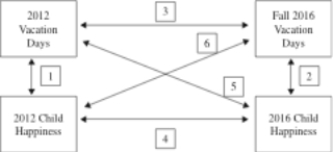Dr. O'Toole is a counseling psychologist who researches family dynamics. He is curious as to whether there is a causal link between the amount of time families spend together on vacation and children's happiness. More specifically, he thinks that spending more time together as a family on vacation causes children to be happier. He designs a study where he samples 63 single-child families in December 2012 and measures how many days the family spent on vacation in the past year as well as the child's happiness. He then contacts the same families in December 2016 and measures those two variables again. The results of his study are below.


There are three possible causal patterns that can be found in a study like Dr. O'Toole's. Choose one causal pattern and explain which correlations need to be significant, which ones should not be significant, and what type of causal claim can be made. Make sure you use the variable names and not just the correlation numbers (e.g., Correlation 1).
Definitions:
Masculine Culture
Culture in which people tend to value traditional roles for men and women, achievement, assertiveness, heroism, and material wealth.
Achievement
The act of accomplishing a goal or reaching a significant milestone through effort, skill, or courage.
Assertiveness
Tendency to make requests, ask for information, and generally pursue one’s own rights and best interests.
Individualistic Cultures
Refer to societies that prioritize the needs and goals of the individual over the group.
Q6: Dr. Fletcher is interested in whether joining
Q8: Dr. Kang, a cognitive psychologist, conducts an
Q11: Dr. Guidry conducts a study examining the
Q13: Dr. Guidry conducts a study examining the
Q15: How does research overcome the problem of
Q31: Using a matched-group design is especially important
Q37: Why might a researcher choose purposive sampling
Q52: Dr. Fletcher is interested in understanding whether
Q57: Dr. Lonsbary is a cognitive psychologist who
Q59: To study the effects of physical discomfort